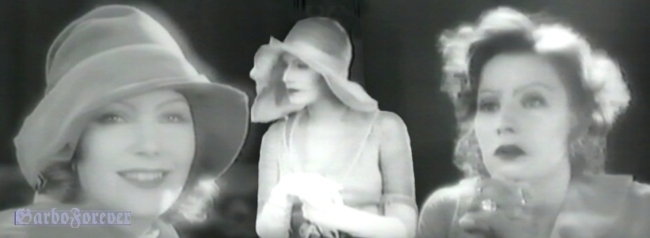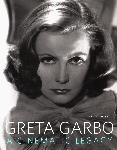 LOVE |
||
(USA 1927)
|
||
| ALTERNATE TITLE | ||
Anna Karenina (GERMANY, UK, BRAZIL & ITALY)
|
||
| FILM SCENES | ||
|
|
||
| COMPANY | ||
Metro-Goldwyn-Mayer (MGM)
|
||
| CREDITS | ||
Directed by Edmund Goulding.
|
||
| TECHNICAL SPECS | ||
84 Minutes
|
||
| CAST | ||
Greta Garbo, John Gilbert, George Fawcett, Emily Fitzroy, Brandon Hurst,
|
||
| GARBO'S CHARACTER | ||
Anna Karenina
|
||
| FILM POSTER | ||
|
||
| SYNOPSIS | ||
Anna Karenina (Greta Garbo) is married to a well-to-do man in Russia during the czarist era. She meets Vronsky (John Gilbert), a military man, and falls in love with him. Her husband, Karenin (Brandon Hurst), refuses her a divorce, so she leaves him and her child, Seresha (Philippe de Lacy). She becomes Vronsky's mistress. Vronsky soon wishes to return to his military life. Anna senses that she is losing him. Realizing that she has nothing to go back to and nothing to look forward to. Vronsky goes back to his military calling. Anna throws herself in front of a train at the railroad station.
|
||
| MOVIE PROGRAM | ||
|
||
| PREMIERED/RELEASED | ||
Premiere date: November 29, 1927 (Embassy Theatre in New York)
|
||
| LOBBYCARDS | ||
|
||
| PRODUCTION | ||
| Production Dates: April, June–July 1927
|
||
| MOVIE STILLS | ||
| The Stills were made during the production by William Grimes. 202 Movie Stills were shot.
|
||
| TRIVIA | ||
|
||
| BACKGROUND STORY | ||
(in Treatment)
|
||
| BUSINESS DATA | ||
| Budget: 488.000 Dollar.
|
||
| PORTRAITS | ||
Ruth Harriet Louise, Clarence Sinclair Bull and Russell Ball made the portraits for the film.
|
||
| REVIEWS | ||
New York Times: |
||
Greta Garbo, the Swedish actress, outshines any other performance she has given on the screen. Miss Garbo's singularly fine acting as Anna held the audience in unusual silence.... Miss Garbo is elusive. Her heavy-lidded eyes, the cold whiteness of her face, and her svelte figure compel interest in her actions. Sometimes she reminds one of a blonde Mona Lisa and on other occasions she is gentle and lovely. Only in one sequence does she seem to be a little out of character and that is probably due to obedience to the director's instructions.
|
||
| Motion Picture: | ||
Lovers of Tolstoy will be disappointed. Those who like to study the Gilbert-Garbo embraces will be disappointed. In fact, the only people who won't be disappointed, like myself, are those who have always thought of Greta Garbo merely as the only woman in pictures who dresses worse than Alice Terry. Because Greta is surprising, and her grace and beauty and fine acting make a cheap, melodramatic picture into something at least interesting, if not good. I recommend it solely that you may see what she was able to do with little help from the script, the director, or John Gilbert.
|
||
| Variety: | ||
| Try and keep the femmes away from this one. They've all apparently got a Gilbert-Garbo complex tucked away somewhere.... The girls get a great kick out of the heavy love stuff. They come out of these pictures with their male escorts and an “I wonder-if-he's-learned-anything” expression. They claim the screen's the closest they can get to it. But pity the poor modern lover. He's so tired from holding up a raccoon coat he can't compete, so no wonder there's an aching heart for every clinch in Hollywood. ... Peculiar combination this Gilbert-Garbo hook-up. Both sprang up suddenly and fast, Miss Garbo from nowhere. The latter isn't now as big as she should be or will be, always remembering it's the stories that count. Neither has she been in enough pictures of late. But if handled, and she will allow herself to be handled, she's the biggest skirt prospect now in pictures. With the start they've got, Miss Garbo and Mr. Gilbert are in a fair way to become the biggest box office mixed team this country has yet known. |
||
| Motion Picture Magazine: | ||
March, 1928. This is a pretty bad movie. It would have been pretty bad anyway, but posing as an adaptation of Tolstoy's “Anna Karenina” it is especially offending. The bare outline of the story can be traced to Tolstoy – the tale of the lady who loves her lover a good deal but her baby son a little more – but beyond that there is no similarity. Lovers of Tolstoy will be disappointed. Those who like to study the Gilbert-Garbo embraces will be disappointed. In fact, the only people who won't be disappointed are those who, like myself, have always thought of Greta Garbo merely as the only woman in pictures who dresses worse than Alice Terry. Because Greta is surprising, and her grace and beauty and fine acting make a cheap, melodramatic picture into something at least interesting, if not good. I recommend it solely that you may see what she was able to do with little help from the script, the director or John Gilbert. |
||
| Photoplay: | ||
| November, 1927. Love is right. The original title of Anna Karenina would have been wrong. It isn't Tolstoi, but it is John Gilbert and Greta Garbo which, after “Flesh and the Devil,” is what the “fans” are crying for. Tolstoi's devastating analysis of the tragedy of illicit love is almost completely made over into the recounting of a love affair between a desirable woman and a desiring man, beautifully presented and magnetically acted. You will have tremendous sympathy for Anna and Aleksei Vronsky, two honorable persons who are the victims of an anti-social force. Even in the new set of circumstances invented for them by Frances Marion, there is something of the original strength of their characters. And Anna throws herself under the grinding wheels of a train at the end, thereby risking an unhappy ending as one little concession to Tolstoi, the censors and those who love the novel. But if you think that the finer side of the book – the romance of Kitty and Kostia Levin – is even hinted at, you are nothing but a silly. The movie has separated the wheat of sex from the chaff of preachment. And so the film comes to us as a glamorous and picturesque romance, untroubled by stern moralizing and flecked by comedy generously presented to Tolstoi in the person of George Fawcett as a Grand Duke. Credit Gilbert with a double assist. Not only does he give a great performance, but he assisted Edmund Goulding in the direction. Greta Garbo is beautiful and touching. Brandan Hurst, as Karenine, also gets in on the glory.
|
||
| SIMILAR FILMS | ||
| Anna Karenina – with Vivien Leigh (UK 1948)
|
||
| AD CAMPAIGN SLOGANS | ||
Greta Garbo and John Gilbert in LOVE
|
||
| THE DELETED "DIMITRI BUCHOWETZKI DIRECTED" FOOTAGE | ||
| The film was originally filmed with Dimitri Buchowetzki as the director and Ricardo Cortez (Torrent) as her leading man. It was more loyal to the original Tolstojs novel but MGM producer I. Thalberg was not satisfied with the filmed sequences of Buchowetzkis work. Thalberg disposed of it and attempted to re-shoot the film with a new director, script and leading man. Unfortunately, the filmed Buchowetzki footage is lost.
|
||
| THE DELETED "EDMUND GOULDING DIRECTED" FOOTAGE | ||
| After Thalberg disposed the filmed Buchowetzk material, he attempted to re-shoot the film with Edmund Goulding as the new director and Norman Kerry as Garbo's leading man. Thalberg still disliked the new footage and since the Garbo Gilbert affair was big promotion, he replaced Norman Kerry with Gilbert and hired his favourite cameraman, William Daniels. Unfortunately, the first filmed Goulding footage is lost and Garbo never made a film with Norman Kerry.
|
||
| PICTURE FROM THE FILM-SET | ||
Garbo and Gilbert.
|
||
| STORY FROM THE FILM-SET | ||
When actress Dorothy Sebastian, introduced herself to Garbo, the star asked her how she felt. “Tired,” said Sebastian. “I'm glad that you are tired,” Garbo smiled wanly. “I like tired people.”
|
||
| ALTERNATE SCENES | ||
| Shortly after the film was completed MGM filmed a new happy ending for the american market. Anna returns from the train station and lands in Vronsky's arms.
|
||
| THE ORIGINAL NOVEL | ||
Based on the novel Anna Karenina by Count Leo Tolstoy . .
|
||
| DVD/VHS | ||
Not Available
|
||
| VIDEO-FILE | ||
See More HERE!
|
||
SOURCE |
||
Greta Garbo: A Cinematic Legacy – by Mark A. Vieira (Harry N. Abrams, Incorporated, New York 2005). This is the best and most accurate book about Garbo's-Films.  |
||
OTHER SOURCES |
||
Karen Swenson – A life Apart Barry Paris – Garbo IMDB – International Movie Database plus many other books, magazines and internet sites. |
||
| Film - Introduction |
© Copyright 2005 – www.GarboForever.com – Germany – TJ & John – The Webmasters